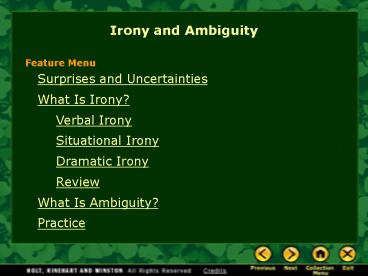Irony and Ambiguity - PowerPoint PPT Presentation
1 / 15
Title:
Irony and Ambiguity
Description:
Read this sentence from Hanson W. Baldwin's R.M.S. Titanic. [End of Section] ... In this passage from Stephen Vincent Ben t's 'By the Water of Babylon,' the ... – PowerPoint PPT presentation
Number of Views:1767
Avg rating:3.0/5.0
Title: Irony and Ambiguity
1
Irony and Ambiguity
Feature Menu
Surprises and Uncertainties What Is Irony? Verbal
Irony Situational Irony Dramatic
Irony Review What Is Ambiguity? Practice
2
Surprises and Uncertainties
Writers use irony and ambiguity to create
true-to-life stories. Irony and ambiguity help
writers convey
- the way real life surprises us, whether to our
delight or to our disappointment
- our lack of knowledge about the future and
whether it will fulfill our expectations
End of Section
3
What Is Irony?
Irony is the contrast between expectation and
reality. Three kinds of irony are
- verbal irony
- situational irony
- dramatic irony
End of Section
4
Verbal Irony
In verbal irony, a speaker says one thing but
means the opposite. Verbal irony
- is the simplest kind of irony
- can become sarcasm if taken to a harsh extreme
5
Verbal Irony
Jane Austens Pride and Prejudice begins with an
excellent example of verbal irony.
It is a truth universally acknowledged, that a
single man in possession of a good fortune must
be in want of a wife.
How might this opening sentence be an example of
verbal irony?
End of Section
6
Situational Irony
In situational irony, what actually happens is
the opposite of what is expected or appropriate.
Situational irony
- is often humorous
- may mock human plans and intentions, which in
real life often come to little
7
Situational Irony
Read this sentence from Hanson W. Baldwins
R.M.S. Titanic.
. . . she was fresh from Harland and Wolffs
Belfast yards, strong in the strength of her
forty-six thousand tons of steel, bent, hammered,
shaped, and riveted through the three years of
her slow birth.
Explain the situational irony in this ship
sinking on its first voyage.
End of Section
8
Dramatic Irony
Dramatic irony occurs when the reader or the
audience knows something important that the
character does not know. Dramatic irony
- adds greatly to the tension in stories, plays,
and movies
- heightens the sense of humor in comedies and
deepens the sense of dread in tragedies
9
Dramatic Irony
In this passage from Stephen Vincent Benéts By
the Water of Babylon, the narrator describes the
vision he has while exploring the ruins of New
York City. What do readers know that the narrator
does not?
When gods war with gods, they use weapons we do
not know. It was fire falling out of the sky and
a mist that poisoned. It was the time of the
Great Burning and the Destruction. They ran about
like ants in the streets of their citypoor gods,
poor gods! Then the towers began to fall. A few
escapedyes, a few. The legends tell it. . . . I
saw it happen, I saw the last of them die. It was
darkness over the broken city and I wept.
End of Section
10
Review
Quick Check
- Identify each item as one of the following
- verbal irony
- situational irony
- dramatic irony
After tripping over his own feet, the teen
exclaims, That was graceful!
The movie audience knows that a hostile alien is
just past the door. Dont go in there! one
viewer yells at the screen.
The guest opens his mouthto compliment the chef,
but before he can speak, he burps long and loudly.
End of Section
11
Review
Quick Check
- Identify each item as one of the following
- verbal irony
- situational irony
- dramatic irony
verbal irony
After tripping over his own feet, the teen
exclaims, That was graceful!
dramatic irony
The movie audience knows that a hostile alien is
just past the door. Dont go in there! one
viewer yells at the screen.
situationalirony
The guest opens his mouthto compliment the chef,
but before he can speak, he burps long and loudly.
12
What Is Ambiguity?
Ambiguity is the element of uncertainty in a
text, in which something can be interpreted in a
number of different ways. Ambiguity
- adds complexity to a work
- invites readers to propose a variety of
interpretations of a work
- is found in subtle language and fine distinctions
in a work
13
What Is Ambiguity?
A works theme or mood may be ambiguous.
- If a complex work has more than one theme, the
works meaning will be ambiguous and multilayered.
- A complex work may shift in tone from humorous to
serious or from joyful to tragic.
14
What Is Ambiguity?
When a work ends in ambiguity, readers must
think about what the ending means. Read the last
lines from R.M.S. Titanic. How do you interpret
the final four words?
The night was clear, reported Lord Mersey,
and the sea was smooth. When she first saw the
rockets, the Californian could have pushed
through the ice to the open water without any
serious risk and so have come to the assistance
of the Titanic. Had she done so she might have
saved many if not all of the lives that were
lost. She made no attempt.
End of Section
15
Practice
Invent an example of each kind of
irony. Describe each example in a paragraph.
Record your examples in a similar chart.
End of Section
16
The End





























![Download [PDF] Douglas Sirk: Filmmaker and Philosopher (Philosophical PowerPoint PPT Presentation](https://s3.amazonaws.com/images.powershow.com/10068596.th0.jpg?_=20240703043)